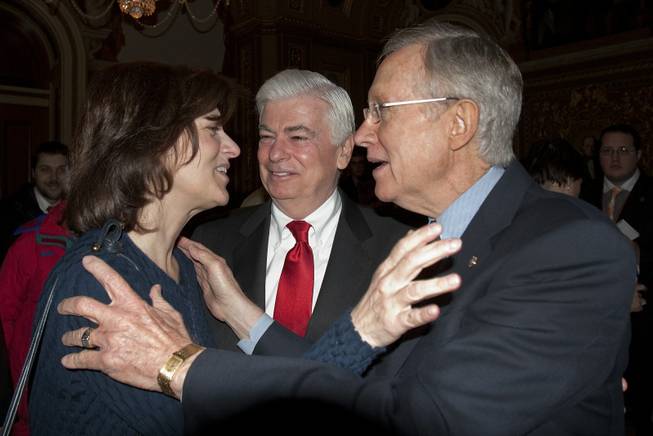
Harry Hamburg / AP
Victoria Kennedy, widow of Sen. Ted Kennedy, hugs Senate Majority Leader Harry Reid of Nevada on Capitol Hill in Washington, Thursday, Dec. 24, 2009, after the Senate passed the health care reform bill. Sen. Christopher Dodd, D-Conn, looks on at center.
Sunday, March 28, 2010 | 2 a.m.
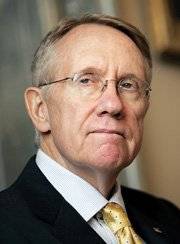
Harry Reid
HEALTH CARE’S PATH TO SIGNING
Spring-summer 2009
Sen. Harry Reid gives chairmen of the Senate’s health and finance committees wide latitude to develop health care reform bills. Talks drag into fall in the finance committee, as Democrats try unsuccessfully to win Republican backing. Reid is increasingly criticized for not playing a stronger role.
Oct. 26, 2009
Reid emerges with his own bill, a merger of legislation passed by the health and finance committees that includes the public option. This is a big win for liberals and progressives who want a government-run alternative to private insurers. But even with Reid’s opt-out clause for states, the public option lacks support among senators.
Nov. 7, 2009
The House passes its bill, a more liberal version than the one being considered in the Senate. President Barack Obama’s inability to complete his top domestic priority threatens his first-year agenda and increases pressure on Reid and the Senate.
Nov. 21, 2009
Reid secures the 60 votes needed in the Senate to open debate. The entire Democratic caucus votes yes. All Republicans vote no, except one who is absent. But several Democrats say they only voted to open debate, and cannot support the bill.
Dec. 24, 2009
After four days of procedural votes, some held in the middle of the night during a blizzard, the Senate passes Reid’s bill. The entire Democratic caucus votes yes. All Republicans, except one who is absent, vote no. Reid, in a fit of exhaustion, mistakenly votes “no” before correcting his vote to “aye.”
Mid-January 2010
In days of tense meetings at the White House, House and Senate leaders try to reconcile their two bills into one that could pass both chambers and be sent to the president. In a midnight session, Reid tells his colleagues it’s time to put aside their differences and pass the bill.
Jan. 19
Republican Scott Brown is elected to the Senate from Massachusetts, winning the seat long held by Democratic Sen. Edward Kennedy. Democrats lose their 60-seat majority in the Senate.
February-March
Reid and House leaders begin gathering support for a two-step process: The House would pass the Senate bill, followed by a package of changes. The Senate would approve the changes under the reconciliation process that needs only 51 votes. On March 20, Reid assures Democrats he has the commitment from a “significant majority” of senators to pass a fix-up bill if the House goes first.
March 21
As protesters keep a vigil outside the Capitol, the House passes both Reid’s Senate bill and its own fix-up bill just before midnight.
Tuesday
Obama signs health care reform into law: “We’re done,” he says. The Senate begins two days of debate on the fix-up bill under the reconciliation process that allows unlimited amendments.
Thursday
After dozens of amendments and a nearly all-night session, the Senate passes the fix-up bill with no Republican support. Three Democrats vote no. Republicans succeed in making slight changes that force the bill back to the House. The House passes the bill that night. It is sent to Obama for his signature.
Sun Archives
- Health fix-up bill passes Senate, heads back to House (3-25-10)
- Obama signs historic $938 billion health overhaul (3-23-2010)
- First changes would start six months after health bill becomes law (3-22-2010)
- Sides getting ready for final battle over health care reform (3-22-2010)
- House clears historic health bill, GOP targets Nevada Democrats (3-21-2010)
- House poised for up-or-down vote on health care reform (3-20-10)
- How a Harry Reid asset has turned into a liability
- A Vegas-style gamble on Obama’s agenda (2-25-2010)
- Reid, Democrats consider health care reform options after losing supermajority in Senate (1-21-2010)
- Senate casts historic vote on health care reform (12-24-09)
It was about midnight and tensions at the White House ran high on that January evening.
House and Senate leaders had been haggling for days to merge their two health care bills. The heady momentum of passing President Barack Obama’s top domestic priority in both chambers had given way to the touchy task of reconciling two very different pieces of legislation.
Their window for passing health care was closing: Republican Scott Brown was gaining ground on the Democratic candidate for the Massachusetts Senate seat long held by Ted Kennedy.
Senate Majority Leader Harry Reid began to speak.
Long on storytelling and short on diplomacy, Reid’s talks always engendered a certain dread among listeners. He launched into a heartfelt, if meandering, story about a Las Vegas family who could not afford health care.
Where was he going with this, some in the Cabinet Room wondered.
Finally, the punch line: “People ought to put away their petty differences and get health care done for the country,” Reid said, according to those present.
It was an unusually forceful statement from a man who speaks so softly he sometimes goes unheard.
“I think Harry has this right,” Obama said. “Let’s get this thing done for the country.”
Days later, Brown won the Massachusetts special election, ending the Democrats’ 60-seat Senate majority. The clear path to health care reform — a task Washington had pursued off and on for a century — vanished, leaving Reid to chart another in the new political landscape.
Reid was unflinching during the long health care debate: the somber, steady workhorse alongside the more passionate House Speaker Nancy Pelosi and the more popular president. He worked a quiet insiders game to accomplish what many saw as impossible.
The majority leader has been questioned at every step by friends and foes alike.
Liberals complained Reid allowed committee chairmen too much latitude to negotiate with Republicans — the failed “Snowe strategy,” named for Republican Sen. Olympia Snowe of Maine, that resulted in a watered-down bill but no bipartisan support.
Moderates thought he wasted time courting liberals with the doomed public option, which did not have enough support to pass.
Some whispered Reid was taking positions merely to boost his dismal standing in Nevada as he fights for his political life this fall.
Even the president, who rode to Washington on a promise of transparent government, backed away after Reid larded the bill with unsavory favors, including the Cornhusker Kickback.
True and valid criticisms, all.
But it is also true that Obama would not have signed the bill in the East Room of the White House last week, declaring, “We are done,” if not for the maneuvering of the senator from Searchlight, according to many involved.
Could Reid have worked differently, more forcefully, to shape a better bill, one more closely resembling the Democratic dream of universal coverage? Or one that fostered bipartisan support rather than unified Republican opposition?
Perhaps another leader could have.
Perhaps another leader would have ended with nothing — as happened every other time a president broached providing health care for all, stretching back to Theodore Roosevelt.
As Obama signed the bill into law Tuesday, he said the nation is “blessed by leaders in each chamber who not only do their jobs very well, but who never lost sight of that larger mission.”
Reid, the president said, is “one of the best majority leaders the Senate has ever had.”
Some heavy-lifting
Snowstorms pounded Washington in the final days of December.
As a blizzard bore down, Sen. Ben Nelson of Nebraska, the Democrats’ most conservative member, was sleeping on a deal he struck with Reid.
It was the Friday before Christmas and much of the city was preparing for the holidays. The House had adjourned.
The Senate still had heavy lifting to do.
Nelson shook hands with the majority leader, committing the 60th vote for health care reform. The two had resolved the difficult issue of abortion funding and agreed to a special Medicaid deal for Nebraska — what would become the toxic Cornhusker Kickback later struck from the law. (Nelson said he never sought special treatment.)
Reid and top Democratic senators gathered in the majority leader’s second-floor office in the Capitol when Obama, returning from climate change talks in Copenhagen, called from Air Force One with congratulations.
The president, on speaker phone, began telling about how several times during the course of negotiations others thought the bill was dead, but Reid pressed forward.
As Obama waxed on, Reid did what he often does when he is done with a conversation: He hung up.
“Thank you, Mr. President, I know you’re very busy,” Reid said.
Click.
For a politician, Reid has an odd relationship with the spotlight. He steps away from the limelight when others seize it. He finds power in letting others lead.
This style has infuriated many Democrats who would prefer a stronger leader, a Lyndon B. Johnson-type who pushes his caucus toward the goal.
But it is what Sen. Kent Conrad of North Dakota, chairman of the powerful Budget Committee, calls the majority leader’s “self-effacing leadership,” that made Reid so successful at gathering votes to pass health care reform amid so many obstacles.
Reid early on delegated authority to his top committee chairmen to craft the bill — Kennedy, the chairman of the Health Committee, and later, after Kennedy became ill, Sen. Chris Dodd of Connecticut and Sen. Max Baucus of Montana, chairman of the Finance Committee.
The Health Committee passed its bill over the summer, before Kennedy died. But the Finance Committee’s work dragged on as Baucus sequestered six senators, Republicans and Democrats, to devise a bipartisan bill.
The Senate adjourned empty-handed in August, leaving a void Republican opponents filled with arguments against reform.
Suddenly imaginary “death panels” and the specter of a socialized government takeover of health care entered the public consciousness. Tea Party protesters filled town-hall meetings. The uprising was swift, and no one, it seemed, had the majority leader’s back.
Democrats fumbled their response, failing to shift popular opinion and give Reid and congressional leaders cover to complete their work.
Instead, detractors in his own party said the Senate was wasting time. Baucus’ bipartisan talks yielded only one Republican vote — Snowe — when the committee finally passed a bill in October. Snowe’s support would be lost in the weeks to come.
Richard Kirsch, campaign manager for Health Care for America Now, a pro-reform advocacy group, said the time Democrats spent trying to attract Republican support “didn’t buy them a thing.”
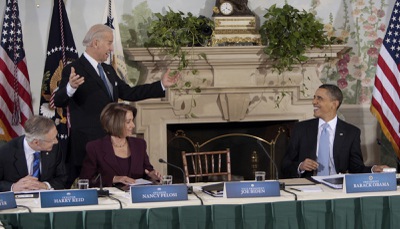
President Barack Obama smiles as he waits for Vice President Joe Biden to take his seat at the Blair House in Washington, Thursday, Feb. 25, 2010, during a meeting with Republican and Democratic Congressional leaders to renew efforts for health care reform. Seated, from left are Senate Majority Leader Harry Reid of Nev., and House Speaker Nancy Pelosi of Calif.
The party faithful were losing faith. A progressive group ran TV ads questioning whether Reid was “strong and effective enough” to craft a bill it could support.
What liberals wanted to see more than anything was a public option — a government-run insurance plan to compete with private insurers.
If Americans would be required to have health insurance, progressives argued, they should have the option of buying it from the government rather than turning over 16 million new customers to insurance companies.
As Reid merged the Health and Finance bills, the House neared passage of its bill, a more liberal version that included a public option and more generous subsidies for the uninsured to buy coverage.
Against this backdrop, Reid directed policy advisers who were holed up in an office in the Dirksen Senate Office Building, a barren room with drab floral curtains and a scuffed-up conference table. There, they pieced together the bill that eventually landed on the president’s desk.
The last time the Senate merged two bills, it had taken eight months. Reid did it in two weeks, in what Nancy-Ann DeParle, the White House’s director of health care policy, called “a wonder to behold.”
When Reid unveiled his bill, on a Monday afternoon in late October, he immediately transformed himself in the eyes of the liberal left from untrustworthy leader to hero.
But he also set up an impossible scenario for passing the legislation.
The bill contained the public option. But even this watered-down version, with an opt-out clause for states that didn’t want to participate, couldn’t pass.
Nelson was among several senators saying they would not support it. For every Democratic senator that Reid lost, he would need to pick up a Republican — a more unlikely feat.
In retrospect, some think Reid was simply trying to appease liberals, showing he was on their side even if the votes did not add up.
“Others had to see Harry tried to get that because they wanted it so badly,” Nelson said in an interview last week.
“I don’t know whether he was bluffing or a part of a gamble,” Nelson said. “I know I wasn’t bluffing.”
A week later, the House passed its bill, putting more pressure on Reid as opposition mounted, and Obama saw his top priority slipping away.
Reid convened another group of senators — moderate and progressive Democrats — to work on the public option. Reid had no margin for error — all 60 Democratic senators would be needed to overcome Republican opposition.
Republicans decried the backroom negotiations. They called out the special favors that would become too toxic to keep in the bill.
No sooner had the group reached consensus on swapping the public option for an expansion of Medicare than the deal blew up. Sen. Joseph Lieberman, the Independent from Connecticut who caucuses with Democrats, announced in mid-December that he would oppose it.
Outraged Democrats said Lieberman should be forced to fall in line. Reid should strong-arm him Johnson-style and strip him of his committee chairmanship.
But Reid, ever the creature of the Senate, would not choose that path. He had not severely punished Lieberman in 2008, when he campaigned against Obama. He would not do so now.
Lieberman would say later that the threat of losing his chairmanship would not have changed his position.
“Threats don’t get you very far,” Lieberman said at the time.
“But,” Lieberman added, “nobody ever said that.”
Something better than nothing
Reid and Obama share a strong bond, a relationship based on deep trust, and it’s unlike any other the president has.
After Lieberman upended the process yet again, Obama asked the majority leader, “Is health care dead?”
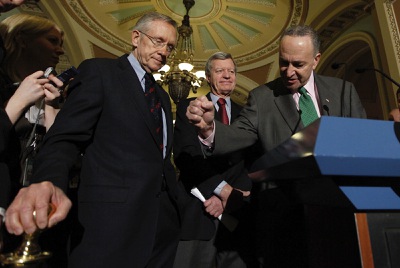
Senate Majority Leader Harry Reid of Nevada, left, listens as Sen. Charles Schumer, D-N.Y., right, drives home a point while answering questions on Capitol Hill in Washington, Thursday, Dec. 24, 2009, after the Senate passed the health care reform bill. Senate Finance Committee Chairman Sen. Max Baucus, D-Mont., is at center.
“No,” Reid said, according to those aware of the conversation. “I’ve got, in the state of Nevada, people who can’t afford health care. I’ll fix it.”
For all his quiet certitude, Reid brings a scattered, Jackson Pollock quality to his work, throwing legislative provisions on the canvas and seeing what sticks.
Reid pivoted again, setting out to convince his progressive wing there was no other choice but to pull the Medicare expansion, ending its hopes for a government-run alternative to private insurers.
Better to have something than nothing, Reid argued. This was important for the presidency, for their party. Democrats, he said, needed to stick together.
Reid brought senators on board, sealed the agreement with Nelson and called the votes.
At 1 a.m. on the Monday before Christmas, senators began streaming to the Capitol for the first of what would be four days of votes to pass Reid’s bill that would become law.
After the first vote showed all 60 senators in the Democratic caucus standing together, Sen. Charles Schumer of New York bound out of the chamber to declare a “total vindication of Harry Reid’s strategy.”
Days later, on Christmas Eve, the senators stood at their desks for the final vote.
The entire Democratic caucus voted yes. All Republicans, except one who was absent, voted no.
When Reid delivered his own vote, he mistakenly cast a “no” before quickly switching to an “aye.” The chamber gasped, then chuckled. Senators later embraced the exhausted Reid and shook his hand.
Reid’s popularity back home crashed, sending dismal poll numbers even lower.
Reconciliation
After the holidays, the House and Senate faced seemingly irreconcilable differences in merging the two bills.
The Senate could never pass the more liberal House bill. And Pelosi knew her Democrats had no stomach for the Senate bill’s more conservative provisions — the so-called Cadillac tax on high-end insurance plans and smaller subsidies for the uninsured.
One of Reid’s great strengths — his ability to cut deals to win support from reluctant senators — also became a Democratic liability: Republicans turned the Cornhusker Kickback and other favors into dirty words. Rank-and-file House members distanced themselves.
The day before Brown’s victory in Massachusetts, Ron Pollack, executive director of Families USA, a leading health reform advocacy group, e-mailed House and Senate leaders, suggesting a two-step process should Brown win.
The House could pass the Senate bill, but the Senate could then follow up with a package of changes to ease House Democrats’ concerns. The Senate, should Brown win, could use the reconciliation process that requires just 51 votes.
Democrats settled on that strategy.
Yet the House has a deep distrust of the Senate, referring to it only in partial jest as the enemy.
Before Pelosi’s rank-and-file could accept the Senate bill, House Democrats needed a guarantee the Senate would make changes.
Once again, it was Reid’s low-key, steady style that kept the process moving.
Another leader might have been more forceful, pushing Pelosi to accept the Senate bill. Another leader might have been more defensive about the House’s mistrust of the Senate.
Reid, Kirsch said, “managed to just keep cool.”
“Some people would question his commitment. He doesn’t show it the same way the president does, the same way the speaker does,” Kirsch said. “Sometimes you want more of an out-front leader. This is the time his strength really makes sense.”
As Pelosi worked to round up support in the House, Reid built support in the Senate.
Some senators were reluctant to use the reconciliation process, which is reserved for the most crucial situations, fearing a backlash from Republicans shut out of the process.
Others wanted changes to the bill. A coalition of liberal senators led by Sen. Bernie Sanders of Vermont wanted an amendment returning the public option.
Reid convinced them, Sanders said, that it might “destabilize a very sensitive situation.” The majority leader promised a vote on the public option after health care reform became law.
“Harry Reid is not a charismatic leader, let’s be clear about that,” Sanders said. “But his sense of decency, which you see day after day … his decency comes out.”
Democrats were racing the clock, trying to wrap up work before the midterm campaign season would overtake politics in Washington. Skittish lawmakers would want to be home talking about jobs, not fighting health care on the Hill.
A new deadline emerged: spring break.
Reid was in his office this month, talking by phone with rural Nevada reporters, when he received heart-wrenching news. Landra, his wife of 50 years, and his only daughter, Lana, had been in a car crash, rear-ended by a tractor-trailer.
His wife’s injuries were serious: She had a broken neck. Reid raced to the hospital.
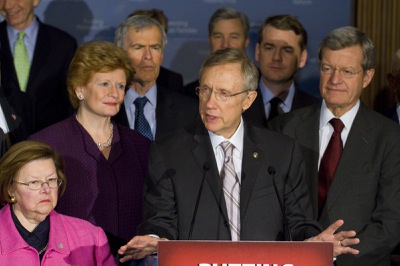
Senate Majority Leader Harry Reid speaks during a health care reform news conference on Capitol Hill in Washington, Thursday, March 25, 2010. From left are, Sen. Barbara Mikulski, D-Md., Sen. Debbie Stabenow, D-Mich, Jeff Bingaman, D-N.M., Reid, Sen. Jeff Merkley, D-Ore., and Sen. Max Baucus, D-Mont.
Reid’s family is his priority. Speculation grew: Would he be able to continue health care talks? His campaign for re-election?
Reid’s wife emerged from surgery with a positive prognosis. Paralysis was out of the picture. After a weekend vigil at the hospital, Reid was back at work Monday.
By week’s end, Reid had a commitment from a “significant majority” of senators to pass the House fix-it bill.
Gone would be the special favors. The Cadillac tax would be postponed. Seniors on Medicare would get a $250 rebate on prescription drug costs. Greater subsidies would be included for the uninsured to buy policies.
The day before the House was scheduled to vote, Obama and Reid met with House Democrats — Obama to rally their support and Reid to promise that the Senate had their backs.
As the House voted near midnight, Reid was at home with his wife, watching on C-SPAN. His phone rang. Congratulations poured in.
Two days later, Reid stood behind the president as Obama used 22 pens to sign into law the health care reform bill the Nevadan had crafted. The two men shook hands, saying little. Reid gave his souvenir pen to his top health care staffer.
Now Reid had to keep his end of the bargain, passing the follow-up bill under the barrage of Republican objections in the Senate.
Two days, dozens of amendments and a nearly all-night debate later, senators again stood at their desks to cast votes. Again, not a single Republican gave his or her support. Three Democrats voted no.
When it came Reid’s time to vote, he, in a fit of exhaustion, again voted “no,” before correcting himself and flashing a thumbs-up.
Reid had made good on his promise. During a victory lap that afternoon, Reid, for once, did not look down when colleagues showered him with praise.
For a brief moment, when Sen. Tom Harkin of Iowa said kind words, Reid seemed to accept it.
“Without the leadership of the son of a hard-rock miner from Nevada,” Harkin said, “this never would have happened.”
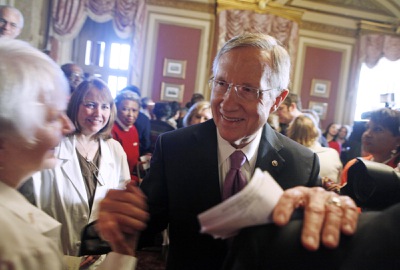

Join the Discussion:
Check this out for a full explanation of our conversion to the LiveFyre commenting system and instructions on how to sign up for an account.
Full comments policy